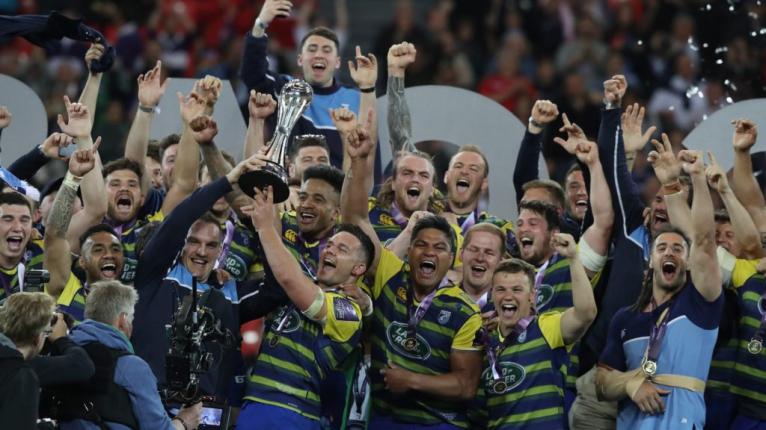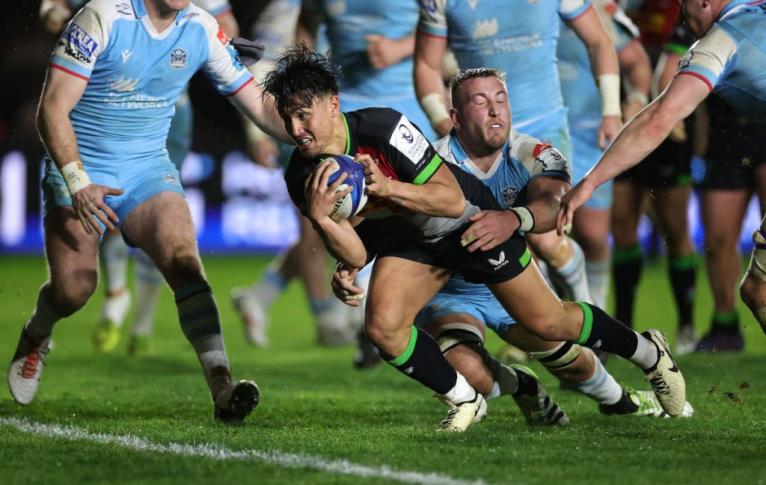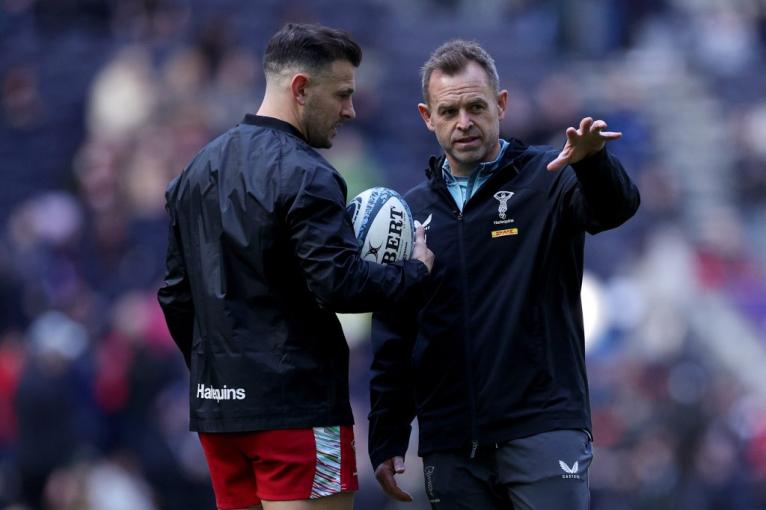Danny Wilson has been here before. Toulouse in a big European showdown, virtually nobody giving his team a prayer of upsetting the rouge et noir Galacticos. Wilson quietly plotting, preparing – believing.
It was 2018 when his Cardiff team slew the giants twice, home and away wins en route to a heady Challenge Cup victory folk in the Welsh capital still cherish deeply. The Toulouse squad featured Joe Tekori and Richie Gray, Maxime Medard and Charlie Faumuina, Gael Fickou in the centres and a couple of young half-backs called Antoine Dupont and Romain Ntamack making their way. Cardiff were on a shoestring. Not in quite the same way the regions are now, but engulfed nonetheless by financial chaos; marquee signings axed, budgets scythed and rancour everywhere.
“I remember playing Toulouse away, Jarrod Evans and Dillon Lewis – two players who are here with me at Harlequins now – were outstanding,” Wilson says. “That gave us momentum in the competition which we fed off at the end of the season.

“It was an amazing time. We were such a tight group. There were financial issues leading to a fair bit of conflict. We had a unique balance – we’d brought some young kids through in Jarrod, Tomos Williams, Garyn Smith and Owen Lane. We also had the experience of Nick Wiliams, Gareth Anscombe and Gethin Jenkins. And we had this really good middle tier of players who had just broken through – Ellis Jenkins, Josh Navidi. We’d signed Rey Lee-Lo and Willis Halaholo. We’d built over three years to get to that point where we’d taken a bit of misery in year one, built in year two, and in year three we had that balance and tightness.”
Cardiff edged Gloucester in a bonkers, see-sawing showpiece in Bilbao’s raucous San Mames. They trailed by six into the final four minutes. Blaine Scully scored a try, Gareth Anscombe missed the conversion, then nailed the cup-winning penalty in the last sixty seconds.
“It’s still my best moment in rugby,” Wilson goes on. “Because of what we’ve been through as a group, how tight we were and we achieved something. The final was the Friday night, we didn’t go home until the Sunday night so we had a good old weekend in Bilbao.
“That was the last time that group was together, it was already decided a lot of us were moving on. There’s a bit of bittersweet there; part of me regrets leaving then, but a lot of me thinks I finished at the right time and left on a high.”
I showed them the three-year plan at Glasgow and it was all ticked off, but if the social media world is loud enough or the result is bad enough, those reactions can be quick and harsh.
There’s a nomadic element to the life of a coach. Wilson signed at Wasps but pulled out of the move when a ticket to international rugby emerged. He flitted to Scotland as Gregor Townsend’s forwards coach, then did two covid-hampered years at Glasgow. There was a short stint at Leicester last term, bridging the gap in set-piece nous between Steve Borthwick’s departure and the arrival of Dan McKellar, and now, since the summer, a brilliant opportunity in charge of Harlequins.
The Glasgow experience was harrowing. Wilson made sound progress against the backdrop of a recruitment freeze then a major squad overhaul, but was sacked, brutally, when his Warriors were vapourised by Leinster in an RDS quarter-final. Scottish Rugby deemed the result, and the public fallout from it, unsurvivable. Wilson’s long-term blueprint was shredded with every try the Dubliners ran in.
“You can’t look too far into the future,” he replies, when asked what the ordeal taught him. “You can put a plan together for the board, your chief exec and say, ‘what are you judging me on? This is the plan I believe will get me there over three years.’ I showed them the three-year plan at Glasgow and it was all ticked off and agreed, but what I learned very quickly is, if the social media world is loud enough or the result is bad enough, those reactions can be quick and harsh. That’s what happened to me.
“Not everyone will agree with this, but it was a shock to me. The scoreline itself was a shock and unacceptable, and getting sacked literally twenty-four hours later was a bigger shock. I thought the dust would settle, the season was finished, recruitment was done and we’d taken steps forward.”

There was something pre-ordained about Harlequins’ blistering run to the semi-finals. They had never won a knockout game in the Champions Cup and if Wilson was going to smash that hoodoo, he’d have to do it against the club who cut him loose, fielding a team Wilson, almost without exception, had recruited and assembled. Their last-16 scrap went to the wire, Sam Riley’s burrowing score clinching it for Quins.
“I’m not gonna lie and say the party line because it wouldn’t be true – it was very satisfying,” Wilson says. “I was really keen to win for a whole host of reasons. It was nice to have an opportunity to go against that team. To make history and do something the club has never done before was the first step and to do that against Glasgow was great.
“Since leaving Glasgow, I had a brilliant experience at Leicester and made the semi-final in the league, and I’m having a brilliant time at Quins and made the semi-final in Europe and hopefully the Premiership play-offs. That’s renewed my confidence and hopefully proved a point.”
Harlequins are an iconic brand and it would be foolish for any coach to wrench them away from what they love and how they excel. Wilson has instilled an ’80-20 model’ – 80% Quins, 20% adaptability. There’s a greater understanding of when, and when not, to spam the gamble button. There’s an acknowledgement, too, the greatest quartered teams of the past have had iron set-pieces underpinning their sparkle.
There was no way in the world Leicester Tigers would play the Harlequins style – no way.
“Since the Six Nations break, we are playing in better weather and we’ve looked at where our opportunities to play are. But so have the opposition. You are almost, without accepting your defence is leaking, knowing we have to go and score five tries to win the game. As soon as you get your head around that, you as a group embrace it. It’s the part of our game model and DNA we are focusing on because it’s giving us the best opportunity to win.
“Your art as a coach is to recognise if you’re new into a place, the players you have and what they’re passionate about, what they’re good at and the way you can and need to play to win games of rugby. There was no way in the world Leicester Tigers would play the Harlequins style – no way. Set-piece, physicality, being in the right areas – that suited Handre Pollard, Ben Youngs, Jasper Wiese, Tommy Reffell. That was the right way for Leicester to play and I very much enjoyed that role.
“Harlequins is the mirror opposite. There are times the weather sets in or sides fill the field with defenders and you need to play differently but on the whole it suits the playing group. It’s not a blueprint you take everywhere you go as a coach. You have to adapt to the players you have and the ethos of the club.”
The ridiculous quarter-final in Bordeaux is a poignant example of embracing the Quins identity. The visitors were 14-0 then 28-12 ahead in the Chaban Delmas cauldron. Bordeaux screamed back with dazzling tries of their own to lead 36-35 approaching the final ten. Tyrone Green put the speculators six clear with another score. Madosh Tambwe weaved between the white jerseys to bring the place to the boil again, but Maxime Lucu arced his conversion wide. The 42-41 banger will be enshrined in European rugby lore.
“That game panned out exactly how we expected,” Wilson says. “The way we would beat them is by what we call swinging the bat. Within our framework, we needed to take the slightly riskier play from deeper, and if we got momentum from deep, keep playing. If we tried to do what Saracens did which is so successful in so many of their games, it wasn’t the right way to go against Bordeaux, you had to chance your arm a bit.
“We were aware it was going to be a very high-scoring game but can we get enough on the scoreboard to win it? They-score-we score – that was genuinely how we planned and got the boys excited about the week.”
At the heart of this daring pageantry is Marcus Smith, perhaps the brightest light in English rugby. His Test credentials have been questioned; critics asking whether this elan will translate to the elite level, whether the structured mastery of George Ford is better suited to the top arena, or if England can play with the same verve as his Smith’s club.

“Marcus wants to play high-speed Quins rugby,” Wilson explains. “His skillset is phenomenal, probably the most talented player I’ve come across, but that talent is matched by hard work. If he was lazy, he wouldn’t be anywhere near the player he is. He is first on the training ground, last off it. He is constantly looking for feedback. He invests in his recovery and his reading of the game and he is mature beyond his years.
“On the field it’s understanding game management. If you look at Finn Russell’s journey, he is passionate about playing fast, beating people, running and playing the brand he enjoys. But he is now as adept at game managing and playing a different way if needed, and I’m seeing Marcus going on that same journey. But you have to give him the licence to do the things he’s good at. He has that here. No way I’m going to stand in the way of the that. He’s been fantastic for us.”
And so, to the south of France again. Harlequins have conquered two of the biggest Top 14 beasts on their own patch; Racing in the pool, and Bordeaux in that rip-roaring quarter. But when Toulouse came to Twickenham back in January, they dished out a 47-19 pasting.
“We have to go with the belief we can win in France,” Wilson says. “We have proven that twice, against two huge teams. Both those games, we’ve fired shots, and gone there to play.
“We certainly won’t be kicking three points in Toulouse. We’ll be going to the corner, playing fast, playing to our identity. That gives us the best chance of winning. We have to score tries because we know they are very capable of doing the same. It won’t be a touchy-feely, find our way into the game; it will be a game of fireworks and hold on to your hat. We have nothing to lose, we are clear underdogs and we will go there to swing the bat.”
Harlequins will not die wondering on their quest for yet more history.


The dressing room had already left for their summer break before they ran out in Dublin that year, and that’s on the coach.
Franco Smith has undoubtedly made progress, particularly their maul, developing squad players and increasing squad depth. And against a very tight budget too. That said they were too lightweight last year and got found out against both Toulon and Munster in consecutive games. Better this season so far but they’ve developed something of a slow start habit occasionally, most notably losing at home to Northampton who played them at their own game. Play offs will ultimately show whether there has been tangible progress on last year, or not…!
Though Wilson’s sacking was pretty brutal, it wasn’t just down to that Leinster game; Glasgow had a lot of 2nd half collapses that season, in the URC and Europe, and only just scraped into the playoffs. Franco Smith has definitely been an improvement, some players are delivering far more than they did under Wilson.